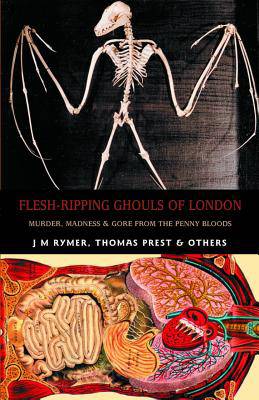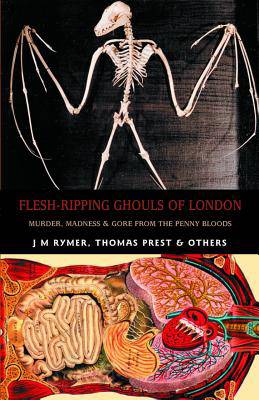
- Afhalen na 1 uur in een winkel met voorraad
- Gratis thuislevering in België vanaf € 30
- Ruim aanbod met 7 miljoen producten
- Afhalen na 1 uur in een winkel met voorraad
- Gratis thuislevering in België vanaf € 30
- Ruim aanbod met 7 miljoen producten
Zoeken
Flesh-Ripping Ghouls of London
Murder, Madness & Gore from the Penny Bloods
Thomas Peckett Prest, James Malcolm Rymer
€ 20,95
+ 41 punten
Omschrijving
At the beginning of the 19th century, higher standards of education, the invention of fast and efficient printing presses, and cheap paper production combined to create a new, mass market for literature in England: sensationalistic, graphic "shilling shockers" for the masses. By 1827, macabre literary material dealing with witchcraft, deformity, depravity, insanity, sadism and gore, could be found in such publications as Legends Of Terror, a 40-part omnibus of supernatural tales, and The Casket, a weekly magazine-type publication which touted itself as "the first of the penny papers"; this was also the period when numerous annals of violent crime, such as The Tell-Tale and The Terrific Register, were published.
Edward Lloyd, a bookseller turned publisher, detonated the penny-pulp market from 1836 onwards with the inauguration of a new line of sensationalistic mass-produced "penny bloods", filled with wild, vivid and gruesome stories and serials written by a pool of writers that included Thomas Peckett Prest, James Malcolm Rymer, and E.P. Hingston. Best-known amongst these works were Varney The Vampyre and The String Of Pearls, featuring Sweeney Todd the Demon Barber. One of Lloyd's most successful rivals, both as an author and later as an editor and publisher, was G.W.M. Reynolds, whose grim 1845 serial Mysteries Of London was immensely popular; in 1846 Reynolds started his own journal, Reynolds' Miscellany, launched with a new serial shocker by Reynolds himself entitled Wagner The Wehr-Wolf.
FLESH-RIPPINGe ^GHOULSe ^OFe ^LONDONe ^is a new anthology which collects 30 true-crime reports, serial chapters and short stories from the golden age of the penny bloods. It constitutes the widest history and selection of this literary output currently available.
Edward Lloyd, a bookseller turned publisher, detonated the penny-pulp market from 1836 onwards with the inauguration of a new line of sensationalistic mass-produced "penny bloods", filled with wild, vivid and gruesome stories and serials written by a pool of writers that included Thomas Peckett Prest, James Malcolm Rymer, and E.P. Hingston. Best-known amongst these works were Varney The Vampyre and The String Of Pearls, featuring Sweeney Todd the Demon Barber. One of Lloyd's most successful rivals, both as an author and later as an editor and publisher, was G.W.M. Reynolds, whose grim 1845 serial Mysteries Of London was immensely popular; in 1846 Reynolds started his own journal, Reynolds' Miscellany, launched with a new serial shocker by Reynolds himself entitled Wagner The Wehr-Wolf.
FLESH-RIPPINGe ^GHOULSe ^OFe ^LONDONe ^is a new anthology which collects 30 true-crime reports, serial chapters and short stories from the golden age of the penny bloods. It constitutes the widest history and selection of this literary output currently available.
Specificaties
Betrokkenen
- Auteur(s):
- Uitgeverij:
Inhoud
- Aantal bladzijden:
- 216
- Taal:
- Engels
- Reeks:
Eigenschappen
- Productcode (EAN):
- 9781902197517
- Verschijningsdatum:
- 30/06/2012
- Uitvoering:
- Paperback
- Formaat:
- Trade paperback (VS)
- Afmetingen:
- 137 mm x 213 mm
- Gewicht:
- 249 g

Alleen bij Standaard Boekhandel
+ 41 punten op je klantenkaart van Standaard Boekhandel
Beoordelingen
We publiceren alleen reviews die voldoen aan de voorwaarden voor reviews. Bekijk onze voorwaarden voor reviews.








